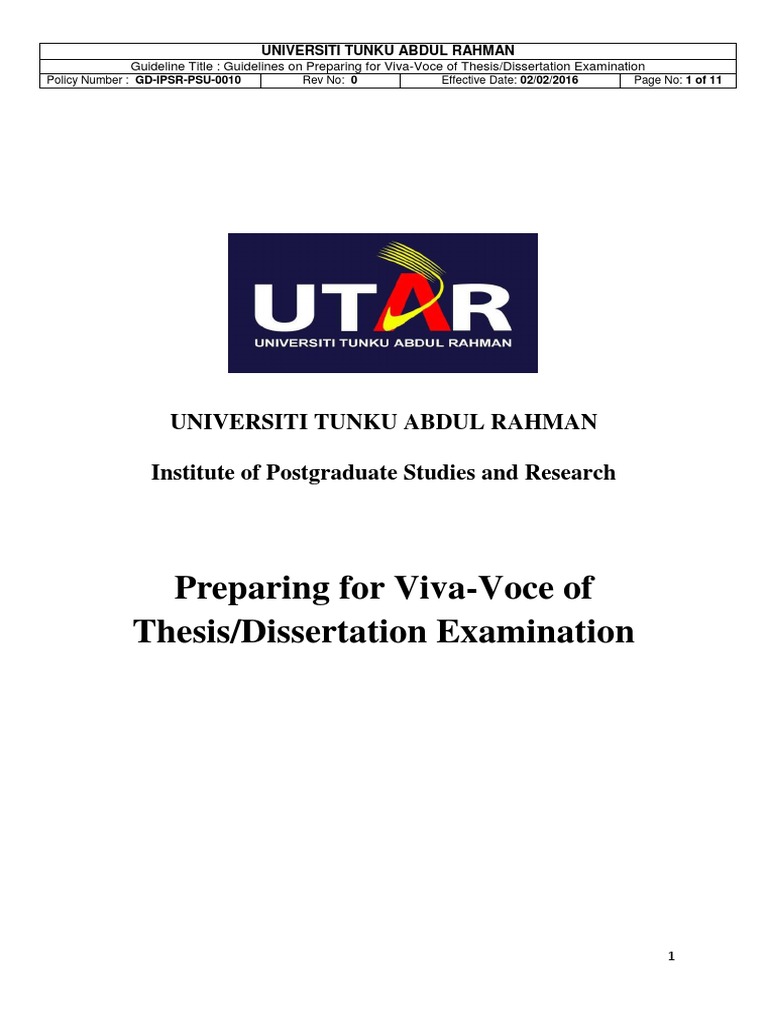
Commonly Asked PhD Viva Questions and How to Answer Them
Thus, we have compiled a list of some of the most important PhD viva preparation steps to help you succeed in your viva. STEP 1 • Take a break. After you have submitted your thesis, it is good to take a 7 to 14 days break and avoid thinking about your work A viva voce is an oral examination whereby the researcher is required to stand before a panel of examiners to defend their dissertation. This is why it is essential for the scholar to ensure that they have clearly mastered the field and the chosen The viva is a long-established part of the examination process for a research degree. The main focus of the assessment is on the written thesis/dissertation (and other outputs, for a Practice as Research students). However, the viva, which is the oral part of the assessment, is used to inform the examiners’ final assessment decision

What will happen in a viva?
· Generally, you can address some basic things that usually answer the questions well, such as: Explain why the topic is important to you. Say why you decided to go with that topic. This could be a time to address your personal beliefs and values. Say there is Thus, we have compiled a list of some of the most important PhD viva preparation steps to help you succeed in your viva. STEP 1 • Take a break. After you have submitted your thesis, it is good to take a 7 to 14 days break and avoid thinking about your work · I’ve been setn, or read, several lists of these – so here they are, my selection of the Top 40 Potential Viva Questions. 1. Can you start by summarising your thesis? 2. Now, can you summarise it in one sentence? 3. What is the idea that binds your thesis together? 4. What motivated and inspired you to carry out this research? 5

UCL facilities
A viva voce is an oral examination whereby the researcher is required to stand before a panel of examiners to defend their dissertation. This is why it is essential for the scholar to ensure that they have clearly mastered the field and the chosen A viva is an academic interview at which your examiners will be looking for an understanding of the subject matter of your thesis, an appreciation of its significance to established knowledge in the field, and an awareness of the breadth of the subject area · I’ve been setn, or read, several lists of these – so here they are, my selection of the Top 40 Potential Viva Questions. 1. Can you start by summarising your thesis? 2. Now, can you summarise it in one sentence? 3. What is the idea that binds your thesis together? 4. What motivated and inspired you to carry out this research? 5

13 Key Questions You Can Expect In The Viva Voce
A viva voce is an oral examination whereby the researcher is required to stand before a panel of examiners to defend their dissertation. This is why it is essential for the scholar to ensure that they have clearly mastered the field and the chosen Thus, we have compiled a list of some of the most important PhD viva preparation steps to help you succeed in your viva. STEP 1 • Take a break. After you have submitted your thesis, it is good to take a 7 to 14 days break and avoid thinking about your work The viva is a long-established part of the examination process for a research degree. The main focus of the assessment is on the written thesis/dissertation (and other outputs, for a Practice as Research students). However, the viva, which is the oral part of the assessment, is used to inform the examiners’ final assessment decision

Some BASIC information about PhD vivas
· Generally, you can address some basic things that usually answer the questions well, such as: Explain why the topic is important to you. Say why you decided to go with that topic. This could be a time to address your personal beliefs and values. Say there is · I’ve been setn, or read, several lists of these – so here they are, my selection of the Top 40 Potential Viva Questions. 1. Can you start by summarising your thesis? 2. Now, can you summarise it in one sentence? 3. What is the idea that binds your thesis together? 4. What motivated and inspired you to carry out this research? 5 · Below are some popular PhD viva questions to prepare: 1. Tell me about yourself. Introduce yourself and talk about your areas of interest related to research. More importantly, focus on the areas you are extremely positive about. Briefly speak about your past achievements without overwhelming the examiners and sounding boastful
No comments:
Post a Comment